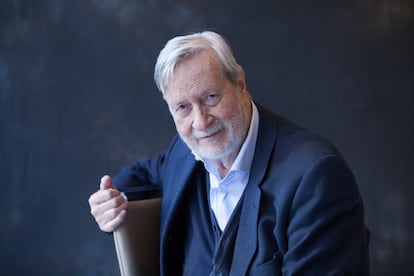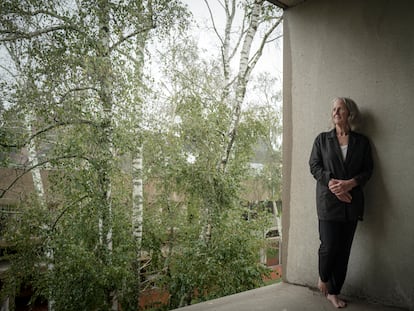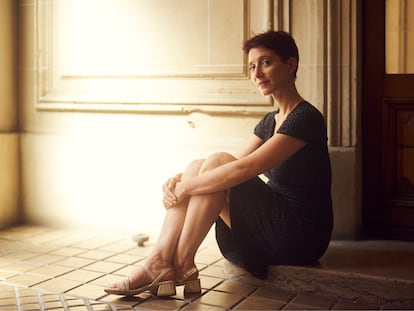At the end of his life, was the great philosopher Gianni Vattimo a victim of the courts or of a predatory assistant?
In his final years, the elderly Italian thinker contended with judges’ accusations that his partner was manipulating him to plunder his assets

In July 2022, the great Italian philosopher Gianni Vattimo, the creator of the theory of weak thought who died on Tuesday at the age of 87, made one of his last public appearances at a press conference at his home. It had nothing to do with philosophy but rather was held to comment on the ruling in which the Supreme Court removed him from the guardian who until then had been administering his assets under a judge’s order. At the press conference, the philosopher spoke about another trial then underway against his Brazilian assistant and partner, 38-year-old Simone Caminada, for allegedly manipulating him to retain his assets. Last February, that trial concluded with a lower court ruling that sentenced the assistant to two years in prison.
For the courts, in the final years of his life, the philosopher—one of the twentieth century’s most brilliant minds—became the unwitting victim of the man with whom he spent his last 14 years. According to the judges, Caminada was a predator taking advantage of Vattimo’s financial and cultural patrimony. But the philosopher himself always rejected that thesis. Now, the question of his will begins what is shaping up to be a turbulent posthumous chapter.
The Turin court began investigating in 2018, after a group of Vattimo’s friends, including the geriatric doctor who cared for him, filed a formal complaint against his assistant because they were concerned about the thinker’s physical and psychological health. From that moment on, the philosopher’s private life became a matter of public knowledge, exposing his human and physical weaknesses. Since then, several lengthy and complicated civil and criminal legal proceedings have followed one after the other, with mutual accusations flying back and forth between people from the philosopher’s social circle and his partner. The different rulings have been contradictory. On several occasions, different guardians were appointed to administer Vattimo’s estate and later removed.
It is hard to tell whether the magistrates intruded into Vattimo’s privacy and restricted his freedom to love and decide, or whether Simone Caminada really took advantage of the philosopher’s vulnerability in order to plunder his assets. One of postmodernity’s most relevant thinkers, Vattimo always defended his lucidity in choosing the company he kept and managing his assets. In the decision to convict Caminada, the judge, who even used wiretaps as evidence, said that Caminada was “affectionate” with the philosopher in public “to prove to others that he was a sincerely protective and emotionally involved figure.” The ruling portrays the assistant as capable of privately creating “cruel moments of coldness” when the thinker was “unwilling to follow [Caminada’s] wishes.” The judge alleges that Vattimo was not in a position to understand “the toxic nature of [his] relationship” with his assistant.
Despite the accusations and the conviction, Vattimo never parted ways with his assistant. “I have never doubted him. If he is convicted, I will not walk away from him,” he said when he testified. In the weeks leading up to the verdict, the two filed a petition to enter into a civil union (same-sex marriage is not allowed in Italy), but judges blocked the proceedings.
A life partner
The couple met in 2010. At the time, the philosopher—a restless leftist soul—was a member of the European Parliament and hired the young Caminada, first as a chauffeur and then as an assistant. Caminada soon took up residence in an apartment on Turin’s Via Po that connected to Vattimo’s flat. He went from helping the philosopher in all his daily tasks to becoming his life partner. The investigation summaries go through the history between the two in detail and describe the Brazilian as “a profiteer and manipulator” who “induced Vattimo to carry out actions detrimental to his assets and his possible heirs,” such as transfers made to the assistant’s mother for amounts greater than his monthly salary and “unjustified” expenses amounting to €60,000 ($63,583.80).
The investigators also point out that Caminada forced Vattimo to take out a life insurance policy worth €415,000 ($439,754.75) on which the assistant was a 40% beneficiary, as well as sign a will in which he named him as his heir, bequeathing Caminada watches, works of art, paintings and other valuable objects, such as a notebook that belonged to Fidel Castro.
Gianni Vattimo explained to the judges that the financial transfers were displays of generosity and altruism. “Until I had some health problems, I’d enjoyed life. And I have helped the people around me to be well,” he said. And he reaffirmed that he always agreed with his assistant on the estate’s management. He also believed that the trial was violating his privacy. Away from court he spoke openly about “judicial persecution.” Shortly before his death, when he was in serious condition in a Turin hospital, the judiciary acted again and appointed a guardian to make decisions about the philosopher’s medical treatment.
Blocked accounts
In the aftermath of Vattimo’s death, the matter of inheritance looks to be a thorny one. In interviews with different Italian media outlets, Caminada has said that he is the “universal heir” in the philosopher’s will, but the accounts are blocked for the moment, pending proof that he is the legitimate beneficiary. The assistant has lashed out at the magistrates and suggested that their actions eventually consumed the philosopher. “Vattimo stopped eating and drinking because he no longer wanted to fight. When he learned that [the courts] wanted to re-block his accounts, he let himself go,” Caminada said in a recent interview with the daily La Repubblica, before getting into a black Jaguar SUV, driven by a chauffeur, to go to an appointment “with the director who is making the documentary about me.”
The Prosecutor’s Office had already seized two of Vattimo’s wills. One was from July 2018, in which the philosopher left Caminada only a part of the inheritance, with another portion going to his ex-wife Martine Tedeschi, as well as 50% of the house in Turin. In another will from September of the same year, Vattimo left all his assets to his assistant.
Martine Tedeschi, singer Carla Bruni’s cousin, was married to Vattimo between 2010 and 2022, although they were never actually together. As she told the newspaper Il Corriere della Sera a few months ago, the philosopher proposed that they marry in order for him to bequeath her his assets, since she is the daughter of the thinker’s dear friend and, despite belonging to Turino’s upper-middle class, she was going through financial difficulties. “One day he told me that he did not want his possessions to be lost, and… he had no one to leave them to, so he proposed that we get married, but that we go on with our own lives,” Tedeschi recounted. She married the philosopher in France, so that the nuptials would be noticed less. They later divorced so that he could form a couple with Caminada.
In that press conference from Vattimo’s living room, Caminada charged the circle of friends who had previously surrounded the philosopher of being there “just to get money from him.” He also cited figures and dates and showed documents that apparently attest to his own innocence and recounted everything that he had done for the philosopher: “I saved his life because last summer it was 40 degrees C [104 degrees F] and I took him to the mountains: if it had been up to the magistrates, he would have died. I just have to thank the [kindness] of the hotel owner, because we had no money to pay,” Caminada said; at the time, his accounts were still blocked.
Already very ill, the philosopher listened in silence, nodded from time to time and answered some blunt questions with great difficulty.
- “Do you trust him?” he was asked at the press conference.
- “Quite a lot,” he answered quietly, evidently tired, and then added a more determined “yes.” Asked why, he replied, “Well... I just trust him.”
Gianni Vattimo’s romantic life was full of pain. His partner, Giampiero Cavaglià, was one of the first to die of AIDS in 1991. Another of his partners, Sergio Mamino, died of lung cancer in 2003.
Sign up for our weekly newsletter to get more English-language news coverage from EL PAÍS USA Edition









































